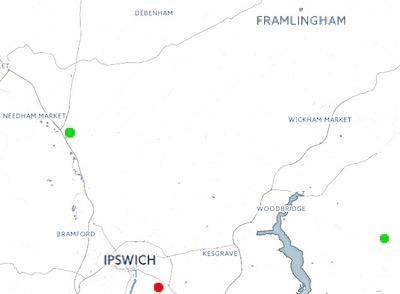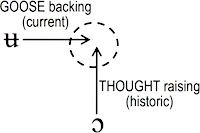People fool in love (extended mix)
(A longer version of my Words of the Week post. The additional material starts here.)
The above video of Ed Sheeran’s song Thinking Out Loud has so far had over 1.25 billion views. Some of its viewers are puzzled by his pronunciation of the line people fall in love in mysterious ways. Here is one contributor to a forum:
…he sings (or atleast it sounds like) “fool” instead of “fall”…
Why does he do that? Is it because he wants to be sing weird and different? Am I crazy or is that the worst thing? ugh it makes me angry just thinking about it.
To which someone replied:
He’s English, so maybe it’s that?
Here’s a clip of the phrase:
Pop singers do sometimes pronounce words in distinctive ways. There’s even an article at Psychology Today in which Siu-Lan Tan suggests various reasons, eg “To define their individual sound, like a sonic signature that makes them distinct.”
But it’s also likely that Sheeran’s English accent is involved. An increasing number of speakers in England, particularly southern England, give fall and fool the same pronunciation. This is visualized beautifully at the Our Dialects site, which is based on fieldwork carried out by Manchester University undergraduates. According to their data on fool and fall, in southern England “29% of speakers pronounce the two words the same.”
Our dialects – FOOL-FALL
Hughes et al. propose that, given its intermediate location between the South West and South East, Southampton features an accent with very distinctive Southern qualities; this is expressed by, amongst other things, a neutralisation of vowels preceding the consonant /l/ (2012: 90).
The site even lets us zoom in to reveal speakers with fool = fall only a few miles from the small Suffolk town of Framlingham where Ed Sheeran grew up (green dots for speakers with fool = fall, red dots for those who differentiate the words):
 Speakers of this type may give the same pronunciation to other words which rhyme with fool and fall. We can hear evidence of this if we listen to Sheeran himself being interviewed. Here he might be saying Pool McCartney:
Speakers of this type may give the same pronunciation to other words which rhyme with fool and fall. We can hear evidence of this if we listen to Sheeran himself being interviewed. Here he might be saying Pool McCartney:
And this might conceivably be These a rule not conventionally attractive people:
but of course he’s saying These are all…
Speakers who give the same pronunciation to fool and fall are merging the GOOSE and THOUGHT vowels before dark syllable-final /l/. How is it that these traditionally dissimilar vowels can merge?
One factor is the phonetically much closer pronunciation of the THOUGHT vowel which contemporary speakers use, compared with the opener quality of accents such as mid-20th century RP and ‘eastern’ General American. That opener vowel is fairly well transcribed by the traditional symbol /ɔː/, but the contemporary realization in southern England is more accurately represented as oː or ʊː. Here is the opener vowel in US English cause from Oxford Dictionaries, followed by the word’s initial portion:
And here is Ed Sheeran using a much closer vowel in the word course, followed by its initial portion:
Another factor is the backing effect of dark /l/ on preceding vowels. In my previous article GOOSE backing, I discussed the GOAT and GOOSE vowels, both of which begin with a central quality unless backed by following dark /l/. Here from the online Cambridge dictionary are code and coal, followed by their initial portions:
And here from the online Collins dictionary are food and fool, followed by their initial portions:
 In other words, the traditional GOOSE symbol /uː/ has long been phonetically inaccurate, but is less inaccurate for the backed allophone which is conditioned by following dark /l/.
In other words, the traditional GOOSE symbol /uː/ has long been phonetically inaccurate, but is less inaccurate for the backed allophone which is conditioned by following dark /l/.
We can hear in that last clip how the backed GOOSE vowel in fool is similar in quality to the close-ish THOUGHT vowel of contemporary fall. Here are the beginnings of Collins’ fool and Sheeran’s course:
Many speakers with homophonous fool and fall consider that both these words contain the THOUGHT vowel. Such a speaker is Shane White, who gave this description of his fool = fall accent in a comment on John Well’s blog:
I am a male, native speaker of RP, born in 1989.
For me, the following are pronounced like so:
rule (as in ‘I wouldn’t rule it out’)
/rɔːl/
ruler (for measuring)
/rʉːlə/
rule (as in ‘He ruled for twenty years’)
/rɔːl/
ruler (= sovereign)
/rɔːlə/
I pronounce school and other words ending in -ool /ɔːl/, making fall and fool homophones, both being pronounced /fɔːl/.
Similarly, tall and tool are also homophones, both being pronounced /tɔːl/.
My father (born 1957) pronounces cool as /kɔːl/ and cooler as /kʉːlə/, whereas I (born 1989) pronounce cool as /kɔːl/ and cooler as /kɔːlə/.
For his unbacked GOOSE vowel, Shane reasonably uses the central vowel symbol /ʉː/ (the CUBE dictionary uses ʉw). Ed Sheeran’s unbacked GOOSE vowel is often even fronter, as we can hear in who was and do that:
Shane uses the traditional symbol /ɔː/ for the THOUGHT vowel of both his fall and his fool. I suspect, of course, that he actually pronounces it with the closer quality I’ve described above, more like oː or ʊː.
The forum contributor that I quoted at the top of this post may well be American, with a relatively open vowel in fall. If so, it’s not surprising that Ed Sheeran’s fall, with its much closer vowel, was heard as fool. I’d be interested to know whether some of the fall = fool speakers in England feel that these two words contain not their THOUGHT vowel but their GOOSE vowel.

